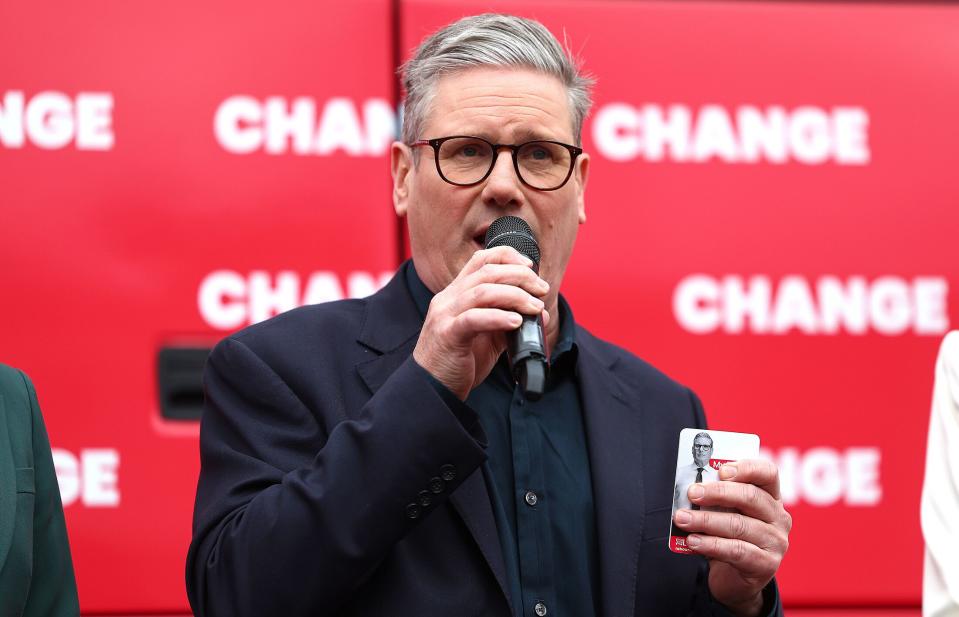Starmer Campaigns on UK Security Ahead of Key Debate With Sunak
(Bloomberg) -- Keir Starmer will pitch Labour as the “party of national security” in a bid to squeeze Rishi Sunak’s Conservatives on traditional Tory turf as the rivals prepare to face off in a UK election debate on Tuesday.
Most Read from Bloomberg
Key Engines of US Consumer Spending Are Losing Steam All at Once
GameStop Shares Surge as Gill’s Reddit Return Shows Huge Bet
Mnuchin Chases Wall Street Glory With His War Chest of Foreign Money
Homebuyers Are Starting to Revolt Over Steep Prices Across US
AMLO Protege Sheinbaum Becomes First Female President in Mexico
During a campaign meeting with veterans in northwest England on Monday, Starmer will reiterate Labour’s commitment to defense via what he calls the “nuclear deterrent triple lock.” In a statement, Labour said 14 ex-military personnel have been chosen to stand as candidates in the July 4 election.
“Keeping our country safe is the bedrock of stability that the British people rightly expect from their government,” Starmer, who has guided Labour to a commanding poll lead since taking over the party in 2020, said in the statement. “My message to them is clear: Labour has changed. No longer the party of protest, Labour is the party of national security.”
Starmer is trying to win the election by campaigning on the political center ground, and by showing voters how Labour has shifted since the general election in 2019 when left-wing leader Jeremy Corbyn guided the party to an historic defeat. Defense is a key part of that, given Corbyn’s ambivalence toward the UK’s nuclear program and North Atlantic Treaty Organization membership.
There were other examples of Starmer’s strategy over the weekend. He announced plans to ban employers who break employment law from hiring workers from abroad, part of his promise to reduce net migration numbers that have soared during the Conservative Party’s 14 years in government.
In an interview with the Times newspaper, Starmer also said wealth creation in the UK would be Labour’s “number one mission” in government, another clear attempt to get businesses and middle class voters on side.
To be sure, Starmer’s move to banish Corbynism still causes tension in Labour, as the row over whether veteran MP Diane Abbott would be allowed to stand again demonstrated last week. On Sunday, she confirmed she would be running, and Starmer will hope that draws the focus back onto the campaign.
Starmer last month became the first Labour leader in three decades to see the UK’s nuclear submarines being built at Barrow-in-Furness in northwest England, and he clearly thinks the Tories are vulnerable on security — despite Sunak making it a key theme in the Conservative campaign.
On Monday, the Labour leader will set out his party’s “deterrent triple lock” as: building four new nuclear submarines; maintaining a continuous at-sea deterrent; and a guarantee of all future upgrades needed for the patrols.
After Starmer pledged to lift defense spending to 2.5% of gross domestic product “when conditions allow,” Sunak’s party promised to do it by 2030, and has tried to make political capital out of Starmer’s refusal to match the timeline.
Sunak’s struggles in the polls have seen him devote the early part of his campaign to trying to win back the core vote from the right-wing Reform UK party. Whereas Starmer has focused on seats he wants to take from the Tories, Sunak has been in areas that normally would be safe for the Conservatives.
Policies including a tax break for pensioners and a promise to bring back national service for younger Britons, which plays into right-wing narratives around social cohesion, failed to move the polls in the Tories’ favor. An Opinium survey published Saturday showed Labour extending its lead to 20 points.
On Monday, Sunak’s party — in power since 2010 — will again pledge to rewrite the UK’s Equality Act to change the definition of “sex” to “biological sex,” a move it has often said is required to protect single-sex spaces.
“Whether it is rapists being housed in women’s prisons, or instances of men playing in women’s sports where they have an unfair advantage, it is clear that public authorities and regulatory bodies are confused about what the law says on sex and gender and when to act,” said Cabinet minister Kemi Badenoch, who is in charge of the women and equalities brief.
Though the pledge is not new, the timing is likely to be seen in the context of Tuesday’s televised debate. Sunak has frequently attacked Starmer over his views on gender and trans rights, most notably when an attempted jibe in the House of Commons backfired in February.
The Tories see the issue as part of a so-called culture war that causes party management issues for Starmer, as well as appealing to Conservative voters who may be considering voting for Reform.
Still, the pressure is on Sunak given that Tuesday’s ITV debate is seen as a key moment to measure progress. The premier’s strategy was to narrow the gap to Labour early in the campaign, and that hasn’t happened.
For Starmer, a series of campaign announcements on wealth, migration and defense appears aimed at maintaining his advantage — and preempting Sunak’s likely attacks.
Most Read from Bloomberg Businessweek
Disney Is Banking On Sequels to Help Get Pixar Back on Track
The Budget Geeks Who Helped Solve an American Economic Puzzle
Israel Seeks Underground Secrets by Tracking Cosmic Particles
How Rage, Boredom and WallStreetBets Created a New Generation of Young American Traders
©2024 Bloomberg L.P.





